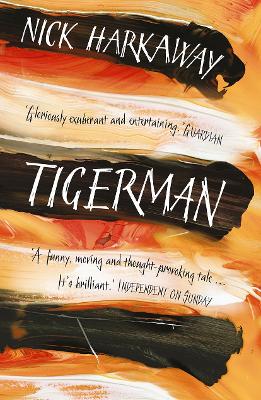Reviewed by Michael @ Knowledge Lost on
Lester Ferris is a sergeant in the British Army, serving in Afghanistan. That was until he was reassigned to the island of Mancreu, where he can serve out his remaining time before retirement without burning out. Mancreu is a former British colony on the verge of destruction. The island is described as the most toxic place on the planet; this is all thanks to the years of pollution and chemical dumping. The United Nations and the World Health Organisation has sent representatives to turn Mancreu into an "Interventional Sacrifice Zone", which basically means everyone leaves so we can obliterate the island.
This island gives the novel an interesting background; on one hand it is home to a range of ethnicities, from Arabs, Africans, Asians and of course Europeans. Since this is a former British colony you can look at this novel through the lens of post-colonialism and get some great value out of it. Also, as the island is scheduled for destruction there is a typical side effect; the lack of laws being enforced has led to a hotbed of unwanted criminals. Using the island to support their smuggling operations, a ring of illicit ships known as ‘the black fleet’ lurk in the bay.
Now you have a protagonist in Lester Ferris who is on the verge of burning out. He is nearly forty and has no family to speak of, his life seems to be the army and the horrors he would have seen serving in Afghanistan may have ruined him. His job is to try and keep the peace without stirring anything up; his position as a sergeant in the British Army on this former colony is purely decorative and he has been sent there to keep him out of the way.
On the island, he friends a street smart, comic obsessed kid which sparks a pseudo-paternal instinct within him. He doesn’t know how to look after a kid but the desire is there. He turns to a masked hero known as Tigerman in the effort to make the island a little better without causing a diplomatic incident. The concepts of being a vigilante and paternal instincts play a big part of Tigerman.
I find that Nick Harkaway often uses a great deal of wit, ambition and irony within his novels and I find Tigerman to be a much more mature offering. Harkaway has already proved his skills in the world of genre fiction but now his is flexing some serious literary muscle. Tigerman is proof that he should be taken seriously as a literary author for this emotionally touching and intellectually satisfying novel. For a fan of literary theories there is plenty to explore in Tigerman; I personally would put on my feminist, post-colonial or psycho-analytical hat if I was to approach this novel as a literary theorist, but I can see many different ways to go about analysing this novel. That is before considering all the intertextuality that runs wild within the novel.
This may be the fanboy within me speaking but I was yet again very impressed with Tigerman. I still hold a special place in my heart for Angelmaker and I think that will always remain my favourite but I have to wonder why I have not read The Gone-Away World yet. I have The Gone-Away World on my shelf and will make sure that I visit it in the not too distant future. What can I say, I’m impressed with Nick Harkaway and I love his unique and well balanced blend of wonderfully energetic genre fiction and smart, witty literary fiction.
This review originally appeared on my blog: http://literary-exploration.com/2014/08/07/tigerman-by-nick-harkaway/
Reading updates
- Started reading
- 10 June, 2014: Finished reading
- 10 June, 2014: Reviewed
